


In the VPN battle that pits Namecheap VPN vs. NordVPN, there’s no doubt NordVPN is the best choice. It is a renowned VPN that guarantees security and privacy and boasts excellent performance and speeds. But still, you can’t rule out Namecheap VPN. It is a go-to solution, especially if you are using other Namecheap services or have a tight budget.
Namecheap VPN, also known as FastVPN, is a new and little-known VPN service compared to NordVPN. The two VPNs share quite a lot in common. They share features such as encryption technology, kill switches, the ability to unblock streaming sites, torrenting, gaming, etc. However, there are nitty gritty differences that should inform your purchase decision. So, what’s the difference between Namecheap and NordVPN?
The difference between Namecheap VPN and NordVPN is the privacy, speed, and reliability when it comes to content access. NordVPN is a more robust VPN that offers excellent security, privacy, and fast speeds, courtesy of a vast network of ultrafast servers and infrastructure. The VPN also offers fast speeds and is reliable in unblocking streaming sites. On the other hand, Namecheap is secure but doesn’t guarantee privacy. The speeds are also slower, and it is not reliable in unblocking some major streaming sites. But the good…it is very cheap.
The above are the main differences between the two services. For more, keep it right here.
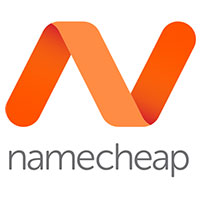
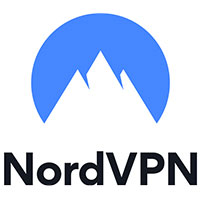


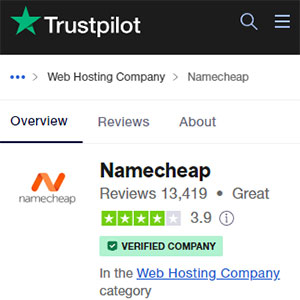
FastVPN (Namecheap VPN) is a new VPN provider owned by Namecheap, a leading Arizona ICANN-accredited domain name registration platform and web hosting company established in 2000.
However, FastVPN is a pretty new service launched in 2021 and has quickly taken advantage of Namecheap’s popularity in the digital space to become a household name in the VPN industry.
We scoured the internet, and we are glad it has good reviews and ratings, save for the fact that it is a white-label version of IPVanish, which has a not-so-good history.
At the time of writing, Namecheap, the entire conglomerate, has a Trustscore of 3.9/5 on Trustpilot after over 13,300 reviews which is pretty impressive.
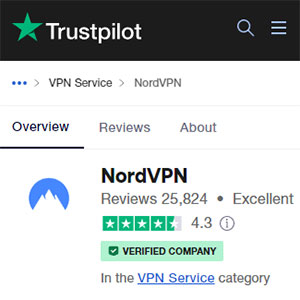
Regarding brand trust, Namecheap FastVPN is not a match for NordVPN, which is arguably the best VPN brand.
Established in 2012, NordVPN is a leading company in the field of cybersecurity and boasts several other products, including NordPass, NordPass Business, and NordLocker.
The award-winning VPN provider owned by Tefincom S.A. has been praised for its unrivaled security and privacy alongside other capabilities like streaming, P2P activity, and gaming.
We also checked consumer review sites and are glad NordVPN has exceptional ratings. At the time of writing, the provider commands a Trustscore of 4.3/5 on Trustpilot after over 25,700 reviews.
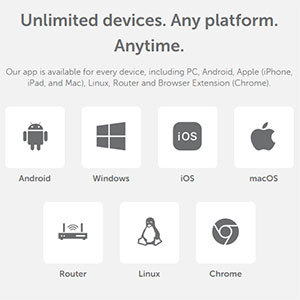
FastVPN is an excellent choice when it comes to supported devices. To start, it allows for unlimited connections on a single license, which means excellent value for money.
It is the perfect fit for the entire family, friends, gaming peer group, and typical buddies.
Regarding compatibility, FastVPN has Windows, macOS, and Linux apps alongside a Google Chrome extension. The VPN also works with Android and iOS mobile devices and routers, ASUSWRT using OpenVPN, Android TVs, Amazon Fire TV, PlayStation, Xbox, etc.
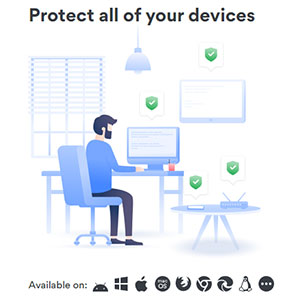
NordVPN also excels in terms of supported devices, but there’s a catch. The catch with NordVPN is that on a single license, you can connect a maximum of 6 devices simultaneously.
But the good thing is that you can always hook up more devices via an already-connected router. Talking of the router, what other devices does NordVPN work with? Well, there are apps for desktops, be it Windows, macOS, or Linux.
NordVPN also has browser extensions for Chrome, Firefox, and Edge and works with Android and iOS devices alongside several other connected devices, including Android TVs, Firestick, Nintendo Switch, PlayStation, Xbox, Chromecast, Raspberry Pi, etc.
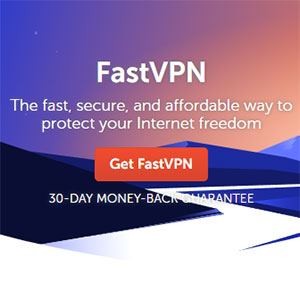
To get started with FastVPN, go to the official landing page of the VPN service. Then, click the “Get VPN” button redirecting to the plans page.
Here, you need to select a plan, sign up for an account, and pay to complete the order. Now that you have a subscription download the client software, install it, and launch it before logging in with your credentials. It’s that simple.
Select a server once the app has launched and click the “Connect” button. The apps are user-friendly, save for the fact that they have frequent bugs. On our usability scale, FastVPN has a score of 4.5/5.
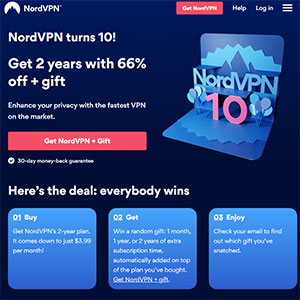
NordVPN is the best option when it comes to usability. Getting started is also easy. Click the “Get NordVPN” button, which redirects to the subscriptions and plans page.
Here, you need to select a preferred plan, create an account and complete the order. The next step will be downloading the software, logging in, selecting a server, and hitting the ‘Connect’ button. It’s that easy.
The apps are more intuitive and are not frequented by bugs like FastVPN’s. On our usability scale, NordVPN leads the pack with 4.7/5.
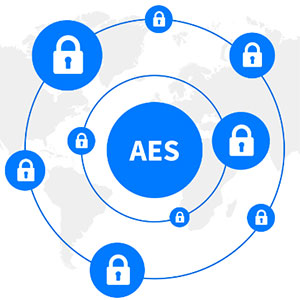
FastVPN may be a little-known and cheap VPN, but it deploys the latest military-grade encryption, AES 256-bit.
This is the most secure encryption technology top government and banking institutions adopt. It is virtually impossible to break into systems secured using 256-bit keys.
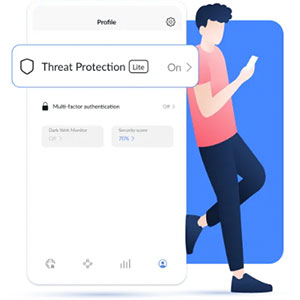
NordVPN being a market leader also doesn’t compromise when it comes to encryption. It is also a solid VPN that encrypts all your data using 256-bit keys, just like Namecheap VPN.
That means it is still an unbreakable VPN. It would take eternity to perform a successful brute-force attack – that’s how secure AES 256-bit encryption is.
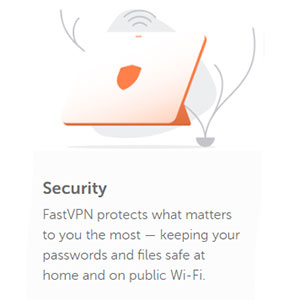
One of the disadvantages of Namecheap FastVPN is that it supports just 3 protocols; WireGuard, OpenVPN, and IKEv2. WireGuard is known for its easy deployment and ultra-fast speeds. Security is beefed up courtesy of its cryptographic protocols.
On the other hand, OpenVPN is a highly secure protocol compatible with multiple platforms. It also works with multiple encryption algorithms. Interestingly, an add-on feature dubbed Scramble (stealth protocol) adds a layer of obfuscation when using OpenVPN.
On the other hand, IKEv2 is a mobile-first VPN protocol and also supports NAT traversal.

NordVPN, too, doesn’t support many protocols. Initially, it supported OpenVPN, IKEv2/IPsec, WireGuard, SSTP, L2TP/IPsec, and PPTP. But as of now, NordVPN supports 3 protocols; IKEv2/IPsec, OpenVPN and NordLynx protocols.
IKEv2/IPsec is a great choice if you want stability, security, and speed. Unfortunately, it has limited compatibility. OpenVPN is the industry standard and offers a good balance between security and speed.
While Namecheap and NordVPN support 3 protocols, NordVPN is ahead of the game courtesy of NordLynx. This is NordVPN’s proprietary protocol that offers airtight security and ultrafast speeds. NordLynx has been built around WireGuard.
Namecheap VPN takes security to the next level with a network kill switch. This feature drops the internet connection when the VPN connection drops inadvertently, so your traffic won’t leak.
Talking of leaks, we conducted thorough IP and DNS leak tests, and all came back negative. This is courtesy of the VPNs IP and DNS Leak Prevention.
Unfortunately, there is not much to discuss regarding Namecheap VPN’s security extras.
NordVPN is the best deal when it comes to security extras. To start, it comes with a network kill switch, so your traffic won’t leak. There’s also IP and DNS Leak Protection, so your IP address and DNS queries will remain intact.
Another great feature is Split Tunneling which enables you to set traffic that should be routed via the VPN and traffic that can connect directly to the internet resource. NordVPN also boasts SOCKS5 proxy, Tor-over-VPN servers, double VPN servers (Multi-Hop Feature), and obfuscated servers that facilitate airtight security and privacy.
Last is CyberSec, which keeps trackers, ads, malware, and phishing threats at bay. If you are keen on security extras, NordVPN is the best choice.
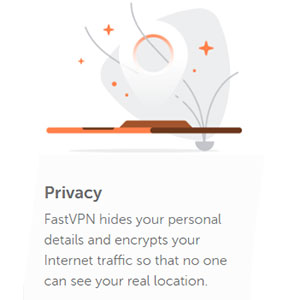
Among the shortcomings of Namecheap Fast VPN is that it is based in the United States. As you may know, the United States is not a privacy-friendly jurisdiction and is a member of the 5, 9, and 14 Eyes surveillance organizations. Besides, the US government can sometimes force ISPs and VPN companies in the US to retain users’ data.
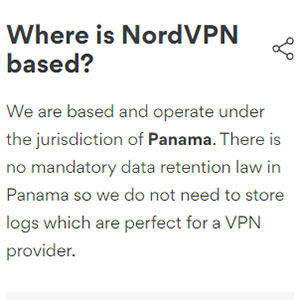
The advantage of NordVPN over Namecheap is that NordVPN is based in Panama, a privacy-friendly jurisdiction. There are no mandatory data retention laws or anything that could compromise users’ privacy.
Namecheap VPN claims to have a 100% no-log policy, like how all other VPN providers say. However, it is not independently audited.
Besides, the privacy policy is not very clear on what information is collected and how it is stored and used. Well, the above are not serious matters, but considering this is the rebranded version of IPVanish, it should not be an option if you mind about privacy.
This is because IPVanish has a past scandal where it was caught pants down logging crucial data. To make matters worse, Namecheap is currently using IPVanish’s infrastructure, including servers.
As for NordVPN, it is also a no-log VPN and a credible one, for that matter.
Interestingly, the company has been audited by PricewaterhouseCoopers A.G., proving that, indeed, they don’t keep any logs of your activity. At no time has NordVPN been caught logging data.
What’s more? NordVPN uses RAM-only servers that wipe out all data after every reboot, guaranteeing no data is logged.
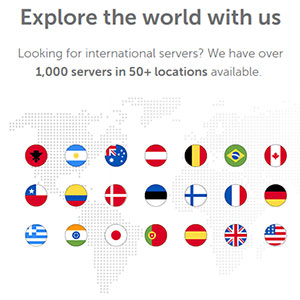
Namecheap FastVPN is a new service with a relatively small server network. At the time of writing, the provider has around 1,000 servers in 50+ locations.
One thing we confirmed is that these are IPVanish servers, and for the record, FastVPN also uses IPVanish IP addresses. In as much as eyebrows can be raised, considering these servers are not owned by Namecheap, we are glad they boast top-of-the-line hardware for speed and reliability.
Some servers are specialized for speed, while others are reliable when it comes to streaming and P2P activity.
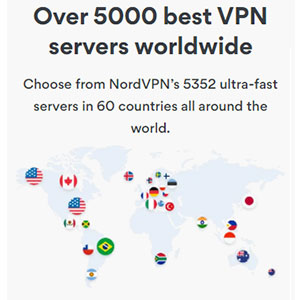
NordVPN is the best choice in terms of server network and distribution. To start, the company has over 5,600 ultrafast servers in over 60 countries. These are highly specialized hired and rented servers that deliver exceptional performance.
NordVPN deploys RAM-only servers that guarantee reliability and privacy, as all data is wiped with every reboot. There are also servers designed to offer fast speeds, while others have been optimized for streaming and P2P activity.
NordVPN goes a step further, bringing on board obfuscated servers that add a layer of security, making NordVPN a good VPN for China and other countries with robust firewalls. The VPN also has Tor over VPN servers. On matters of servers, NordVPN is way ahead of Namecheap VPN.
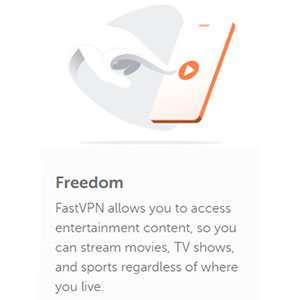
Namecheap VPN is a good VPN for streaming but certainly not the best. We wanted to find out how it ranks regarding reliability, so we tried unblocking several streaming sites.
Unfortunately, the results were not so convincing. It unblocked all Netflix libraries we tried, from Netflix US to the UK, Canada, and Japan. It was also reliable in unblocking Hulu, YouTube, and HBO. However, FastVPN didn’t unblock BBC iPlayer, Amazon Prime Video, Crunchyroll, Disney, and several other sites.
When it comes to torrenting and P2P activity, the VPN is good, but the speeds were rather slow. Last, on gaming, FastVPN is a secure VPN that can shield gamers from DDoS attacks and other threats.
Regarding performance, there is much room for improvement as speeds dropped significantly, and the ping was quite high, at 35ms.
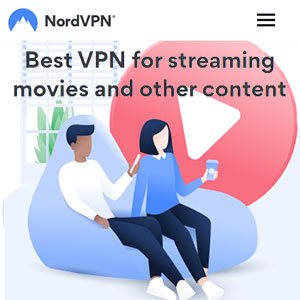
NordVPN is the best choice for streaming, torrenting, and gaming. To start, it is very reliable in unblocking streaming sites. In our tests, we unblocked all Netflix libraries and enjoyed smooth 4K streaming without buffering. Besides Netflix, NordVPN can unblock Hulu, Disney, BBC iPlayer, Amazon Prime Video, HBO Max, Youtube, DAZN, and other streaming sites.
As for torrenting, NordVPN is also fantastic. It has P2P-friendly servers that guarantee safe torrenting and P2P sharing. At no time did we experience slow speeds attributed to bandwidth throttling from ISPs.
Last, on gaming, you can rely on it to secure your console and online gaming activity from DDoS attacks and other threats. The VPN is also ideal for enhancing performance and ping for smooth gameplay.
The speeds were fast, and the latency was low at 21ms when playing Call of Duty. Accessing geo-restricted gaming content, such as new maps and discounts, is also possible with NordVPN.
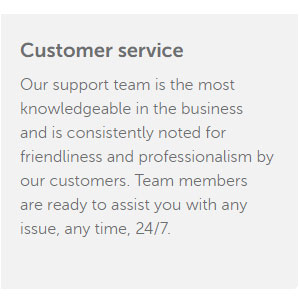
Namecheap is a renowned brand with excellent customer support across multiple channels.
The best is the live chat. We are glad the team is eager to help, but unfortunately, most agents are not well-versed in the VPN service.
Besides live chat, you can submit a ticket. Other options include the knowledgebase, tutorials, and guides at the Namecheap Help Center.
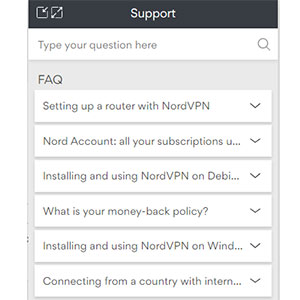
NordVPN also has reliable customer support available across multiple channels. The best is, of course, the live chat because of instant feedback.
One thing we like about NordVPN is that the agents are well-versed with VPNs, so don’t expect back-and-forth communication, as is the case with Namecheap VPN.
Other support options include email, troubleshooting guides, tutorials, and more.

One of the best things about FastVPN is its affordability. There are two plans; 1-Month Plan for $0.99 a month billed monthly and a 1-Year Plan for $1.57 a month billed once annually.
There is no Namecheap VPN free version or trial, but you can take advantage of the 30-day money-back guarantee. The available payment methods include; Visa, MasterCard, AMEX, Discover, PayPal, and even cryptos such as Bitcoin.
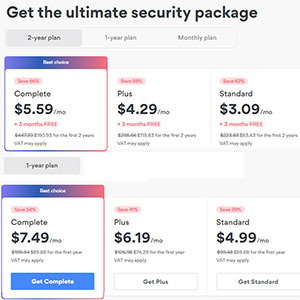
NordVPN is a premium VPN that costs an arm and a leg compared to FastVPN, but we are glad the plans are flexible. There are 3 products; Standard, Plus, and Complete. Plans start at $3.99 a month, billed biannually. This is the best value plan.
There is no NordVPN free version, but the company offers a 30-day money-back guarantee. The available payment methods include Mastercard, American Express, Maestro, JCB, Discover, and even cryptos such as Ethereum, Bitcoin, and Ripple.

That’s the end of this Namecheap VPN vs. NordVPN comparison review. As you have seen, Namecheap is a great VPN if you are on a tight budget, as it is much cheaper. It also offers excellent security though privacy is not guaranteed.
All said and done, NordVPN is the winner of this battle as it is an established brand that deploys state-of-the-art infrastructure guaranteeing uptight security and privacy, fast speeds, and reliability in streaming, torrenting, and gaming. Check out the latest NordVPN deals and discounts and take charge of your digital footprint.